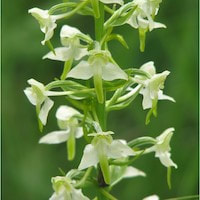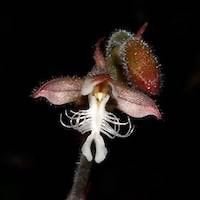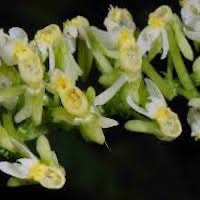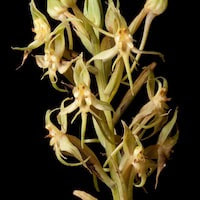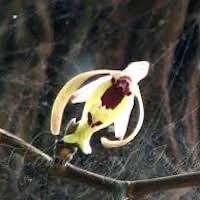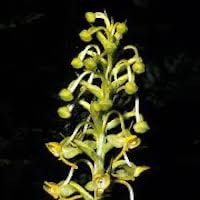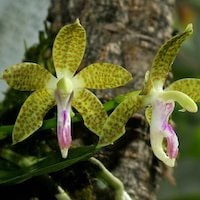Experience the Tranquil Woody Essence of Women Fragrance Oil Woody 6
Contains scented notes of various orchids in different proportions. Among them is the Native Singaporean Orchid, Platanthera Bifolia, also known as Lesser Butterfly Orchid. It emits a strong and pleasant scent reminiscent of lilac. According to a legend, these flowers were visited by angels during Jesus' prayer, giving them a unique shape. The scent of Platanthera Bifolia attracts night butterflies, including hawk moths and geometrid and owlet moths. Its chemical composition includes lilac alcohols and aldehydes, linalool, and caryophyllene. This orchid contains therapeutic compounds like loroglossin, phytoalexin, quercetin, and kaempferol. Platanthera Bifolia is even used in the production of a healthy drink called Selap in Turkey and Iran.
The fragrance composition also includes therapeutic orchid notes from Anoectochilus reinwardtii Blume, which is believed to possess magical powers and is used by the Iban and Kelabit tribes of Borneo to treat infertility. Calanthe davidii Franch., with numerous flowers and a distribution range from India to southern Japan, is used in Chinese herbal medicine.
Habenaria stenopetala Lindl., found in various regions across Asia, including Pakistan, India, Tibet, and Taiwan, is used in Traditional Chinese Medicine (CTM) to enhance kidney and sexual functions. Luisia tenuifolia Blume Syn. Luisia birchea Blume, commonly found on tree trunks in southern India, is used for its emollient properties and to treat various conditions. Plantanthera edgeworthii (Hook f. ex Collett) RK Gupta syn. Habenaria edgeworthii Lindl., distributed from China to the northwest Himalayas and Tamil Nadu, is valued in Ayurvedic medicine for its tonic and aphrodisiac qualities. Sedirea subparishii (Z.H. Tsi) Christianson syn. Hygrochilus subparishii Z.H. Tsi, known as the Fragrant Orchid, has a pleasant sweetish scent and is used in CTM to counter heat and wind.
The fragrance composition is further enriched by additional scent notes of Aspen Tree, Ebony, Oak, paperbark, copahu balm, Gurjan balsam, and Styra, contributing to its unique aroma.
The fragrance composition also includes therapeutic orchid notes from Anoectochilus reinwardtii Blume, which is believed to possess magical powers and is used by the Iban and Kelabit tribes of Borneo to treat infertility. Calanthe davidii Franch., with numerous flowers and a distribution range from India to southern Japan, is used in Chinese herbal medicine.
Habenaria stenopetala Lindl., found in various regions across Asia, including Pakistan, India, Tibet, and Taiwan, is used in Traditional Chinese Medicine (CTM) to enhance kidney and sexual functions. Luisia tenuifolia Blume Syn. Luisia birchea Blume, commonly found on tree trunks in southern India, is used for its emollient properties and to treat various conditions. Plantanthera edgeworthii (Hook f. ex Collett) RK Gupta syn. Habenaria edgeworthii Lindl., distributed from China to the northwest Himalayas and Tamil Nadu, is valued in Ayurvedic medicine for its tonic and aphrodisiac qualities. Sedirea subparishii (Z.H. Tsi) Christianson syn. Hygrochilus subparishii Z.H. Tsi, known as the Fragrant Orchid, has a pleasant sweetish scent and is used in CTM to counter heat and wind.
The fragrance composition is further enriched by additional scent notes of Aspen Tree, Ebony, Oak, paperbark, copahu balm, Gurjan balsam, and Styra, contributing to its unique aroma.
Download the guided mediation that works best with this Orchid fragrance oil
| women_woody_essential_oil_orchi_00006.mp3 | |
| File Size: | 169755 kb |
| File Type: | mp3 |
Discover the Orchid's Healing Touch: A Fragrance for Women
Contains Scented Notes of following in various proportions:
Native Singaporean Orchid notes: Platanthera Bifolia
|
Platanthera Bifolia - Used in Woody 6 (Women) for Team building Perfume workshop
Scandinavian name: Nattviole (night violet) ; German name: Waldhyazinthe (wood hyacinth) and Chinese name: Xijushechun Lan Platanthera Bifolia, commonly known as Lesser Butterfly Orchid, is a fragrant orchid species that has gained cultural significance through various legends and traditional uses. According to an old legend, during Jesus' prayer the night before his crucifixion, a group of angels descended to comfort him and placed themselves in the flowers of the Lesser Butterfly Orchid. As a tribute to this event, the flowers of this orchid are said to resemble angels and emit a strong and pleasant scent, shining white in the twilight on summer nights. Apart from its association with the legend, the scent of Platanthera Bifolia has also been found to attract night butterflies, particularly hawk moths, as well as geometrid and owlet moths. This adds to the allure of its fragrance, making it captivating not only to humans but also to nocturnal pollinators. An analysis of the scent composition of Platanthera bifolia subsp. osca, conducted through SPME-GC-MS (Solid Phase Microextraction-Gas Chromatography-Mass Spectrometry), revealed the presence of several key components. The main components identified were lilac alcohols B, C, and D, as well as lilac aldehydes A, B, and C. These compounds contribute to the distinctive lilac-like fragrance of the orchid. Additionally, other significant chemical components detected in the scent were linalool and caryophyllene, which further enhance the olfactory profile of Platanthera Bifolia. Beyond its aromatic qualities, Platanthera Bifolia possesses therapeutic compounds that contribute to its potential health benefits. It contains loroglossin, a phenolic glycoside known for its antioxidant properties, and phytoalexin, a natural defense compound found in plants. Furthermore, the plant leaves of Platanthera Bifolia contain two flavonols, quercetin, and kaempferol, which are known for their various biological activities. In some regions, such as Turkey and Iran, Platanthera Bifolia is utilized in the preparation of a healthy drink called Selap. This traditional use highlights the cultural significance of the orchid beyond its fragrance, as it is incorporated into local culinary practices and enjoyed for its potential health benefits. Overall, the fragrance of Platanthera Bifolia, with its lilac-like scent and captivating legends, adds a unique and enchanting note to perfumes such as Woody 6 (Women) used in team-building perfume workshops. Its therapeutic compounds and traditional uses further enhance its value and appeal in various cultural contexts. |
Therapeutic Orchid notes:
|
Anoectochilus reinwardtii Blume
Anoectochilus reinwardtii Blume, commonly known as Jewel Orchid, is a species of orchid that is renowned for its distinctive scent and believed magical powers. It is native to the regions of Sumatra, Java, Borneo, and Maluku, where it thrives at elevations ranging from 1400 to 1700 meters. One of the fascinating aspects of Anoectochilus reinwardtii is its association with magical beliefs and traditional medicinal practices. Among the Iban and Kelabit tribes of Borneo, this orchid is considered to possess special powers and is utilized in the treatment of infertility. According to local belief, women who have difficulty conceiving may have their chances improved by placing leaves from a single Anoectochilus reinwardtii plant under their sleeping mat. This ritual is believed to enhance fertility and increase the likelihood of successful conception. While the exact mechanism behind the purported magical powers of Anoectochilus reinwardtii remains rooted in folklore and cultural practices, its fragrance plays a significant role in these beliefs. The scent emitted by the orchid is thought to possess certain qualities that contribute to its perceived mystical properties. However, detailed scientific studies specifically focusing on the scent of Anoectochilus reinwardtii are limited. As a result, the specific aromatic compounds responsible for its fragrance have not been extensively characterized or identified. It is important to note that the cultural significance and traditional uses of Anoectochilus reinwardtii, including its association with fertility treatment, are deeply rooted in local beliefs and practices. These beliefs are passed down through generations and contribute to the rich cultural heritage of the communities that have interacted with this orchid species for centuries. In conclusion, Anoectochilus reinwardtii Blume, known as Jewel Orchid, is an orchid species with a captivating scent and a long-standing association with magical powers. Its fragrance and traditional uses, particularly in the treatment of infertility by certain indigenous tribes of Borneo, are deeply embedded in local cultural beliefs and practices. However, further scientific research is needed to fully explore and understand the scent composition and potential aromatic compounds of this orchid species. |
|
Calanthe davidii Franch.
Chinese name: Jianyexiaji Lan (sword leaf prawn spine orchid) Changyegenjie Lan Chinese medicinal name: Mayaqi (the name is shared with Calanthe alpina) Calanthe davidii Franch., also known as Sword Leaf Prawn Spine Orchid, is an orchid species with a fascinating scent and diverse applications in Chinese Herbal Medicine. It is commonly referred to as "Jianyexiaji Lan" in Chinese, which translates to its distinctive sword-shaped leaves and prawn spine-like appearance. Another Chinese name for this orchid is "Changyegenjie Lan." Calanthe davidii is characterized by numerous flowers that grow in crowded clusters with randomly oriented blooms. It is distributed across a wide geographical range, spanning from India to southern China, Taiwan, and southern Japan. However, there are concerns about its conservation status, as it is believed to be seriously endangered or possibly extinct in the Himalayas. In Chinese Herbal Medicine, Calanthe davidii and another orchid species, Calanthe alpina, share the same Chinese medicinal name, "Mayaqi." This indicates that both species are used interchangeably for their medicinal properties. The herb is valued for its therapeutic benefits and is incorporated into various Chinese herbal remedies. The specific applications of Calanthe davidii and Calanthe alpina in Chinese Herbal Medicine are diverse. They are utilized in the treatment of various ailments, although the precise uses may vary depending on specific formulations and regional practices. These orchids may be employed for their potential effects on the body, such as promoting general well-being, addressing specific health conditions, or supporting overall herbal formulas. Despite their historical usage and medicinal significance, it is important to note that scientific research on the specific scent of Calanthe davidii and its fragrance composition is limited. Further investigation is needed to fully explore and understand the aromatic profile of this orchid species. In conclusion, Calanthe davidii Franch., also known as Sword Leaf Prawn Spine Orchid, possesses an intriguing scent and holds significant importance in Chinese Herbal Medicine. Its flowers are abundant and randomly oriented, and it is distributed across regions ranging from India to southern China, Taiwan, and southern Japan. While it may be endangered or extinct in the Himalayas, it remains a valuable herb in Chinese Herbal Medicine under the name "Mayaqi." However, more research is required to elucidate the specific scent components of Calanthe davidii and their potential contributions to its therapeutic properties. |
|
Habenaria stenopetala Lindl.
Chinese name: Xiabanyufenghua Chinese medicinal name: Jishencao Habenaria stenopetala Lindl., commonly known as Xiabanyufenghua in Chinese, is a terrestrial herb with a variable height. It blooms from August to October in different regions, including Thailand, China, and India. It can be found in open areas or dipterocarp forests at elevations ranging from 300 to 1800 meters. Its distribution includes countries such as Pakistan, northern India, Southeast Asia, Tibet, Guizhou, Taiwan, and the Ryukyu Islands of Japan. In traditional Chinese medicine (CTM), Habenaria stenopetala, known as Jishencao, is recognized for its medicinal properties. It is used to address conditions such as erectile dysfunction and hernias. Additionally, it is believed to enhance kidney and sexual functions. The medicine derived from this plant involves boiling 3-9 grams of the dried plant material. It is noteworthy that Habenaria is a diverse genus with 54 species present in China alone, of which 13 species are employed in Chinese herbal medicine. Similarly, an equal number of Habenaria species are used medicinally in India. It is interesting to note that the specific usages of Habenaria species may differ between the two countries, with certain species being utilized in one country but not in the other. While the detailed information about the specific scent of Habenaria stenopetala is limited, its medicinal usage and geographical distribution highlight its significance in traditional medicine practices. Further research is needed to explore the aromatic profile and potential fragrance components of this herb. |
|
Luisia tenuifolia Blume Syn. Luisia birchea Blume
Luisia tenuifolia Blume, also known as Luisia birchea Blume, is a robust orchid species that is primarily distributed in southern India. It thrives in high elevations above 1500 meters and can be commonly found in clusters on tree trunks in the region, including the Andaman and Nicobar Islands. While specific information about the fragrance of Luisia tenuifolia is limited, it is known for its medicinal properties and traditional uses. In herbal medicine, the entire plant is pounded and utilized as an emollient. It is often applied as a poultice to treat various conditions such as swellings, including boils, abscesses, and tumors. Additionally, a powder derived from the plant is mixed with vinegar to address ailments such as kidney disease, scalding, leucorrhoea (vaginal discharge), and gonorrhea. The focus of its usage in traditional medicine highlights its potential therapeutic properties. However, further research is needed to explore and understand the specific fragrance characteristics of Luisia tenuifolia. |
|
Plantanthera edgeworthii (Hook f. ex Collett) RK Gupta syn. Habenaria edgeworthii Lindl., Habenaria acuminata (Twaites) Trimen
Indian Ayurvedic names: Riddhi, Riddhi Vridhi, Laksmi, Mangala, Rathanga, Rissisrista, Saravajanpriya, Siddhi, Sukha, Vasa, Yuga, Kakoli. (in Garhwal): also Pranda, Talgranthisamakand, Vamavartal, Vrisya Plantanthera edgeworthii, also known as Habenaria edgeworthii, is an orchid species with a notable presence in the northwest Himalayas and the Anamalai Hills of Tamil Nadu, India. In Ayurvedic medicine, this orchid is revered and has been assigned various Indian names such as Riddhi, Riddhi Vridhi, Laksmi, Mangala, Rathanga, Rissisrista, Saravajanpriya, Siddhi, Sukha, Vasa, Yuga, and Kakoli. In the Garhwal region, it is also called Pranda, Talgranthisamakand, Vamavartal, and Vrisya. The plant's herbal usage is significant in Ayurveda, where its roots are consumed as food or as a tonic. It is known to have aphrodisiac properties and is characterized by its sweet taste. According to Ayurvedic principles, Riddhi pacifies the Vata and Pitta doshas but can aggravate the Kapha dosha. This means it is beneficial for individuals who are slim or driven, but not suitable for those who are laid back or obese. Moreover, Riddhi is considered cooling and is believed to promote semen production. Additionally, the leaves and roots of Plantanthera edgeworthii are employed in treating various "diseases of the blood." In the Indian Himalayas, specifically in Garhwal, the powdered orchid pseudobulb is used as an ingredient in Ashtavarga and Swarnabhashma preparations. Ashtavarga is a traditional Ayurvedic formulation, while Swarnabhashma is a medication derived from gold calcinations. Together, they create a potion to promote milk production. Vriddhi holds a versatile role in Ayurvedic medicine and is used as a brain tonic, general tonic, depurant (blood purifier), appetizer, rasayana (rejuvenative), and emollient. The recommended oral dose of the powdered tuber is 2–3 grams. Due to its therapeutic properties and Ayurvedic significance, Plantanthera edgeworthii has found its place in various traditional Ayurvedic formulations such as Astavarga churna, Chyavanprash rasayana, and Mahamayura ghrita. While its herbal and medicinal applications are well-established in Ayurvedic practices, specific information regarding the fragrance of Plantanthera edgeworthii is not readily available and requires further research and exploration. |
|
Sedirea subparishii (Z.H. Tsi) Christianson syn. Hygrochilus subparishii Z.H. Tsi
Chinese name: Duanjingeji Lan Chinese medicinal name: Zhijialan Fragrant Orchid: This has a nice sweetish scent. Sedirea subparishii, also known as Hygrochilus subparishii, is a fragrant orchid species native to China. It is referred to as "Duanjingeji Lan" in Chinese, and its Chinese medicinal name is "Zhijialan." Fragrance: Sedirea subparishii is recognized for its pleasant sweetish scent. The aroma of this orchid adds to its allure and appeal, making it a sought-after species for enthusiasts and botanical enthusiasts. Herbal Usage: In Traditional Chinese Medicine (CTM), Sedirea subparishii is used for its medicinal properties. It is believed to possess properties that counteract heat and wind in the body. A decoction is prepared using approximately 30 grams of the herb, which is then sweetened with white sugar. This decoction is typically administered to children who are suffering from acute illnesses involving the brain and nerves. It is essential to note that while Sedirea subparishii is used for its medicinal properties, its application in Traditional Chinese Medicine is mainly focused on addressing specific health conditions. The sweetish fragrance of this orchid might not be the primary factor in its medicinal usage, but rather its chemical constituents and potential therapeutic effects. Further research and scientific studies would be necessary to uncover the specific chemical components responsible for the sweetish scent of Sedirea subparishii and to explore any potential additional aromatic properties or applications it may have. |
Other scent note
Aspen Tree, Ebony, Oak, paperbark, copahu balm, Gurjan balsam, Styra
Scentopia Library Reference ingredient
bamboo- Singapore native plant - Check details at Scentopia's scent library
Join Scentopia's wonderful orchid scent crafting, fragrance tour, bridal shower or corporate team building which includes perfume making onsite and offsite, beach activities and more. We also serve primary school learning journey, secondary students and pupil on industrial excursions. Know more about our orchids perfume bar or therapeutic orchid scents and other wellness aromas. Conatct Perfume workshop or book a scent crafting session here.
